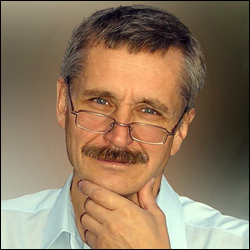Former Head of Information and Analytical Center of the Presidential Administration Aleh Praliaskouski is appointed the Minister of Information. The appropriate decree was signed by the Belarusian President on Friday, 4 December 2009.
Mr. Praliaskouski changed in this position Uladzimir Rusakevich, who was the Minister of Information since August 2003.
This shuffle within the regime ranks caused quite a lot of talk amongst independently minded and media related professionals in Belarus.
Journalist=ideology worker
Ms Litvina commented:
 “Appointment of Aleh Praliaskouski, who has experience of managing ideology work in the country, is another proof of the state seeing no difference between the professions of journalist and ideology worker.
“Appointment of Aleh Praliaskouski, who has experience of managing ideology work in the country, is another proof of the state seeing no difference between the professions of journalist and ideology worker.
Media field is still regarded by the government as one of the priorities of propaganda work. One of my concerns is that during his work at the Major Ideology Department Mr. Praliaskouski was a consistent supporter of an idea of state regulation of Internet. Journalists remember his statements about the necessity of legal providing for responsibility for distribution of information in Internet. This new appointment may be a sign of the state being ready to get back to the issue of asserting control over the Internet.”
Stalinist style of administration
Aliaksandr Klaskouski practically echoes the BAJ statement on the pages of Naša Niva independent publication in his article “Nomenklatura Matrix: Reloaded,” adding his sarcastic comments aimed the president himself: “Practically, it is a Stalinist style of administration of the state elites. First, the big head are being shuffled not to form clans and not to grow too many connections around their positions of power. Second, they are moved and bossed around not to get too comfortable at the official high ranking jobs.”
The analyst believed that there were no essential reforms of the public administration introduced with the 4 December appointments. There were also other changes of positions in the State Security Council, ministries of defence and economics, state executive committees.
 Mr Klaskouski had no sentiments for the so-called liberalisation. He thought that this short lived era was over with the appointment of Mr Praliaskouski. The new information minister, at his previous position, was responsible for “burning down the independent media field. The axe [of ideology] was raised over the head of Internet publications. He [Praliaskouski] was the one to say that there should be a strict state control over the internet activities.
Mr Klaskouski had no sentiments for the so-called liberalisation. He thought that this short lived era was over with the appointment of Mr Praliaskouski. The new information minister, at his previous position, was responsible for “burning down the independent media field. The axe [of ideology] was raised over the head of Internet publications. He [Praliaskouski] was the one to say that there should be a strict state control over the internet activities.
The coming of a real hawk on the place of not-so-evil Rusakevich [previous minister of information] is, most importantly, a preparation of the media sphere for the upcoming presidential campaign.”
Summing up Mr Klaskouski noted that Europe essentially bought an expired product from the Belarusian regime labelled ‘media liberalisation.’
“The paradigm of development of the Belarusian elites is nowhere to be seen,” he concluded.
Controversial figure
Despite the criticism and worries, it is worth mentioning that it was during Mr Praliaskouski’s time as a head of Ideology Department of the Presidential Administration when the independent newspapers Naša Niva and Narodnaja Vola were returned into the state-owned distribution system and reappeared in subscription catalogues of the BelPost service.
Also the new minister made news back in 2007 after he met with the black listed rock-musicians and promised them lifting a ban on their concerts in Belarus. Though on the condition that the rockers would not meddle into politics.
Either way, Mr Praliaskouski as the minister will be judged from his actual actions on a new position.
***
Aleh Praliaskouski, 46, graduated from the Minsk Higher Engineer Anti-aircraft Rocket Military School (1985) and the Faculty of Law of the Belarusian State University (1998). He served in the army and in the Presidential Security Service. Afterwards, Praliaskouski was a General Manager of BelTA Information Agency, a Deputy Head of the Presidential Administration (2003), the Head of Major Ideology Department of the Presidential Administration (2007) and the Director of Information and Analytical Centre of the Presidential Administration (2008).


